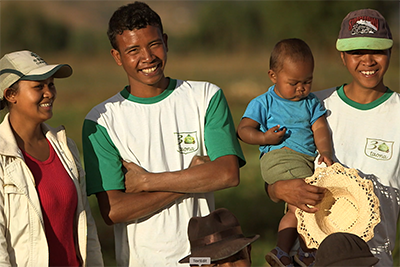
A new video from NCBA CLUSA’s U.S. Agency for International Development (USAID)-funded Cooperative Development Project (CDP) in Madagascar illustrates the 7 Cooperative Principles through the work and daily lives of local co-op members in the dairy, livestock and pink peppercorn industries.
One of the goals of CDP is to improve the business performance of cooperatives. By focusing on the health of their herds, members of the Vondrona Koperativa Rononon’i Vakinankaratra (ROVA) Dairy Union have doubled the quantity of milk they sell—from 10 to 20 liters per cow. Healthier cows mean higher quality milk, too.
By practicing Principle 6—cooperation among cooperatives—ROVA member co-ops have leveraged their strength to shift power back into the hands of milk producers, rather than buyers. The co-op association was also able to jointly purchase a milk-processing unit that benefits the entire community.
Another cooperative, Madaomby, has seen cattle theft drop by 50 percent due to a partnership the co-op was able to negotiate with Madagascar’s Ministry of Defense.
Principle 5—education, training and information—was critical to the pink peppercorn farmers who make up Tsaborose Cooperative. By learning to improve the quality of their product and achieving market standards, the co-op now has contracts with 13 peppercorn buyers. They used to work with just one.
Members of Tsaborose Cooperative are also practicing Principle 7—concern for community—by investing in their villages. They created the Village Community Mutual Aid Group to provide support in financial management and resource development.
Watch the full video below.


